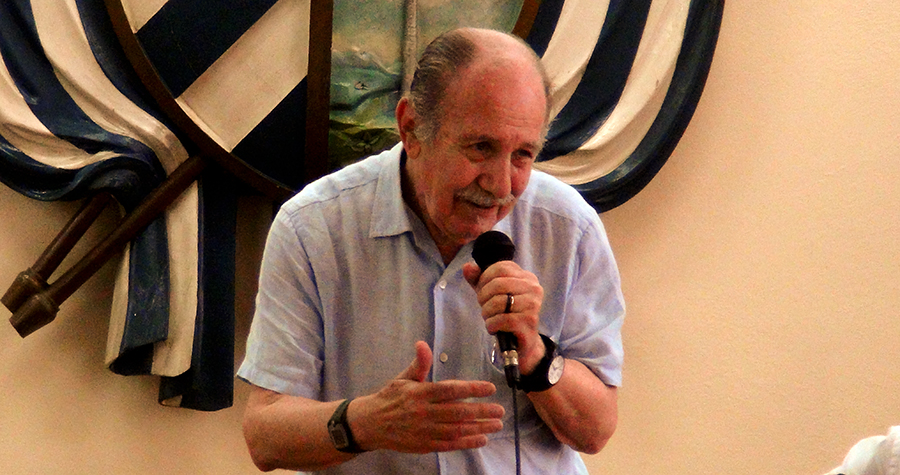
60 minutes with Paul Singer
HAVANA – In other, not-too-distant times, the views of Paul Singer, a Brazilian of Austrian origin, would have prompted a political commissar to write that what he said at a conference in Cuba was “a conspiracy against the powers of the revolutionary government.”
This wasn’t the first visit to this country of this octogenarian man, in poor physical health, enviable spiritual health and the owner of an extraordinary didactic sense in his opinions. As an added value, his concept of humor is very similar to ours.
Paul Singer is a man of the left, from head to toe. “Many of our ideas were born here, in Cuba,” he admits. He came to this capital invited by the University of Havana’s Cooperative Studies Network, an institution that is increasingly taking part in the process of renewal ongoing in Cuban society.
The posts and responsibilities held by our visitor fill almost half a typewritten page. The most significant: doctor in Sociology at the University of São Paulo (USP), national secretary of Solidarity Economics at the Ministry of Labor, former professor at the USP’s School of Hygiene and Public Health, founder of the Brazilian Center for Planning (CEBRAP), a militant member of Solidarity Economics, and former secretary of Planning for the city of São Paulo, among others.
Room 250 at the university was filled to capacity. Professor Singer’s topic: “Cooperativism and socialism in Brazil.” In the audience were university professors and students, functionaries from the Domestic Trade ministry and — most important in our opinion — numerous representatives of urban cooperatives engaged in trades as diverse as recreation, wine-making and instruments for weighing.
Lamentably, there was no one to represent our backyard produce gardens, a group with large representation in Brazil.
Singer explained that the terms or policies of solidarity economics and family farming responded to reasons entrenched in Brazil, although they were influenced by social or political events dating to the 1980s in Europe.
That was one reason for the leading roles assumed by the Catholic Church (remember Liberation Theology, Frei Betto, and Bishop Hélder Câmara), the labor unions and then-President Inácio Lula da Silva.
Within that context, Singer viewed cooperatives and solidarity economics as synonyms. They have the same objective, he said: to create an anti-capitalist alternative for the workers and by the workers. However, he said wisely, “the medium in which cooperatives operate can modify them.”
The professor knows well one of the greatest conflicts besetting cooperativism worldwide.
“Whenever a cooperative has partners and employees, there will be a class struggle, and that could mean the end of solidarity economics,” he says. He has no solution for such a huge contradiction, he admits, humbly.
“I would say that cooperatives are contradictory and human, inasmuch as almost everything that’s human is contradictory,” he adds.
Our cooperative members asked valuable questions, concerns about their own businesses, not expressed on behalf of others. There was real interest in finding out how cooperativism works in a fraternal country, Brazil.
They took notes, perhaps to share them with their comrades at work, to analyze them as a whole or discuss them with others involved in the cooperativist movement.
Jesús Cruz Reyes, a professor at the university’s School of Economics, added to the agenda a point — apparently common to Cuba and Brazil — that is awaiting a deeper analysis: “false” cooperatives.
“Some function as cooperatives only for the founders, but for the wage-earners represent the boss, the businessman. Others do the dirty work for the big companies,” he said.
It could be said that the gathering hinted at many topics that require deeper analysis in the context of Cuba’s economic and social updating. It gave the attendees an opportunity to learn from traditions established years ago and to study other life experiences.
It was a very commendable experience, provided by the University of Havana’s Cooperative Studies Network when it invited cooperativists and journalists who recorded such a singular event, one that hopefully will be repeated.
With Professor Singer came Tatiana Ribeiro Veloso, a specialist in Cooperativism at the Federal University of Bahia, and Dr. Valmor Schiochet, a specialist in political sociology and former director of Solidarity Economics at the Brazilian Ministry of Labor.
The times in Cuba are indeed changing.
[Photos of Paul Singer by Rachel D. Rojas.]


